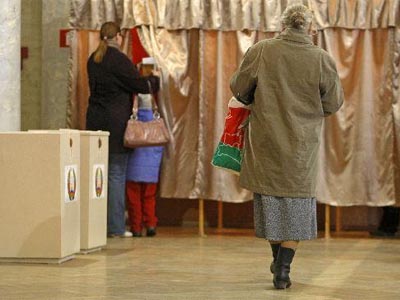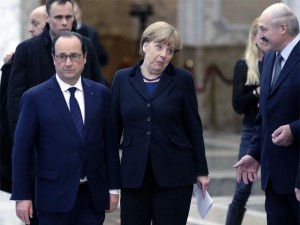Poland and Germany were both initiators and drivers of a New Eastern policy linked to the Eastern neighborhood and Russia/Soviet Union.
Uladzimir Matskevich: Each voter should now answer the question “Why did I take part in fraud?”

In the eyes of the public constant falsification of turnout at the election makes it look like the regime is supported by people, even if it is illegitimate.
Uladzimir Matskevich, the head of the Board of the International Consortium “EuroBelarus” in the talk with the EuroBelarus Information Service shared his attitude towards the local election, which took place on March 23.
— Did you attend the local election?
— No, I didn’t; and I didn’t advise the others to do that. Being a part of the Belarusan nation, I’m not participating in the fraud against my people.
— Sergey Kalyakin, the leader of Belarusan Left Party “A Just World”, voted for himself and said that active civil stand has to be cultivated by personal example. Can people express their civil stand through the senseless attendance of the election district?
— Our opinions, stances and actions have never coincided, though we are both in the opposition to the existing regime. I do not support the irresponsible opinion about the necessity for everyone to have his own opinion; someone has to choose and support the right position. Now after the so-called local elections, everyone who voted, everyone who was a candidate should answer the question: why did I take part in fraud? And why Kalyakin is so persistent in urging people to be accomplice to the fraud of Belarusans?
— After the referendum in Crimea Lidia Yermoshina, the head of the Central Election Commission stated that Crimean referendums are impossible in Belarus. However, according to the declared turnout, these phenomena are of the same order. Why is Central Election Commission so stubborn in falsifying the turnout? Who needs all the fuss with preliminary voting and percentage?
— Political regimes are either based on legitimacy or on PR and artificial image. Belarusan regime is illegitimate: illegitimate election, illegitimate local councils, illegitimate House of Representatives, illegitimate president. Belarusan regime is only supported by RP and blown-up authority. In the eyes of the public constant falsification of turnout at the election makes it look like the regime is supported by people, even if it is illegitimate.
— “Liberalization, which took place, corresponds to our life. Yes, it might increase the competition. The forthcoming election is likely to be more open, transparent. I don’t think that the legislation has changed to the point that the changes will be followed by some kind of Maidan in Belarus, God forbid,” said Lukashenko on March 23 at the lection district. Is Lukashenko afraid of square strikes or is it something more than that?
— It is only complacency and message to the public opinion. However, there is distortion: Maidan does not depend on laws, Maidan happens when the laws are violated and the authorities are breaching all limits.
Each Maidan or revolution is a necessary action, a response to the situation when the top circles have no will and lower classes have no power. To prevent revolution laws should be observed. If the authorities have no intention to listen to their people, to the opposition and the civil society, Maidan is unavoidable.
Indeed, Maidan will hardly happen in Belarus in the near future. But if the regime doesn’t change its policy, the consequences will be even scarier.
— Lidia Yermoshina stated that local election is the first stage of the presidential one. Is it possible that the local councils turn into regional committees similar to that of Communist Party of the Soviet Union?
— No, of course it is impossible. In Soviet Union there existed double system of authority: soviet and loyal to the party line. These two systems acted in concord. In today’s Belarus there are no party structures, local councils have different functions: they ink the centralized vertical power with enterprises, with management, with private industry. Each deputy is the lobbies for the interest of the enterprise he is working at.
Starting from 1995, eligible lists in Belarus are submitted for the approval, and election just disguises the real purpose of the deputies. This principle was fully implemented by 2004 parliamentary elections, and almost all 100 deputies are allocated since then.
I cannot but agree that the local election is a mere threshold to the presidential campaign. I want to appeal to everyone who is somehow involved in the political process: if we can’t make the regime hear our voices, let’s abstain from participation in the forthcoming election. Let presidential campaign of 2015 be a simulation per se. Let Lukashenko be the only presidential candidate, so that no calls made by Kalyakin disturb people.
— But any election has technical candidates like Sergei Gaidukevich...
— Let them appear. But why do we need to become accomplices in crime?
Others
-
Uladzimir Matskevich: The sooner the "Union State" is denounced, the better for Belarus
Not only does the “Union State” undermine the establishment of civilized relations with Europe, but it hinders the possibility of normal relations between Belarus and Russia.
-
Uladzimir Matskevich: The regime can no longer control the situation in the country
The authorities are unable to prolong the social contract with the people: there is no way out of the social crisis.
-
Press release of the BNP in connection with the next round of the dialogue in the format of the EU-Belarus Coordination Group
Belarusan National Platform of the Eastern Partnership Civil Society Forum welcomes the dialogue process in the format of the EU-Belarus Coordination Group, the third round of which was held in Minsk on 3-4 April 2017.
-
Hennadiy Maksak: Europe must react adequately to the events in Minsk
A new wave of political repressions should make the EU return to tougher policy towards the Belarusan regime.








Comments
From farewell to a new Eastern policy and towards a new development
Poland and Germany were both initiators and drivers of a New Eastern policy linked to the Eastern neighborhood and Russia/Soviet Union.